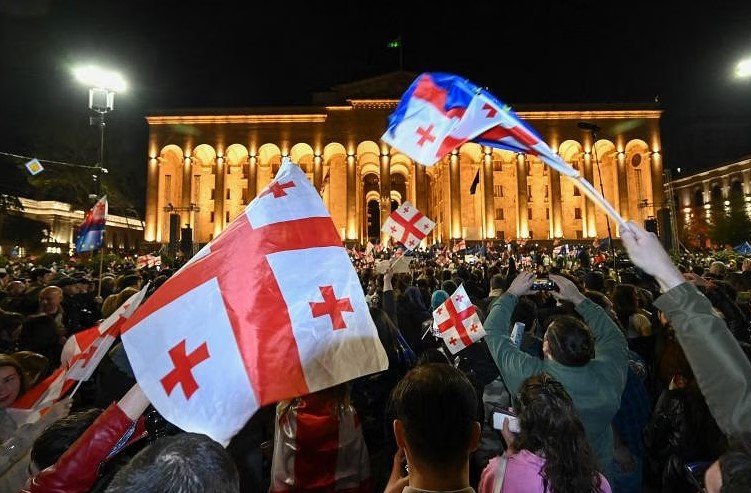In the heart of Tbilisi, a wave of democratic fervor sweeps through the streets as thousands of citizens unite in a defining moment for Georgia’s future. The contentious draft law on foreign influence has sparked a national debate, pitting aspirations for European integration against fears of creeping Russian authoritarianism.
The Pulse of Protest
The air in Tbilisi is electric with chants of “Yes to Europe! No to Russian law!” as citizens from all walks of life gather in a resounding display of unity. Students, professionals, and activists stand shoulder to shoulder, their voices echoing off the historic facades of Rustaveli Avenue. The proposed legislation, they argue, threatens to undermine the very fabric of Georgia’s democratic aspirations, drawing parallels to repressive measures seen in Russia.

The draft law demands that organizations receiving over 20% of their funding from abroad register as entities serving foreign interests. Critics decry this as an attempt to stigmatize and silence independent voices, fearing a regression into the shadows of Soviet-era control. The government’s stance, however, frames the bill as a necessary step for transparency, a claim met with skepticism by the throngs of protesters.
A Nation at a Crossroads
Georgia stands on the precipice of a decision that will shape its trajectory for generations to come. The tug-of-war between East and West is not just a geopolitical struggle but a reflection of the nation’s soul. The draft law has become a litmus test for Georgia’s commitment to European values, with many citizens viewing it as a barrier to their EU ambitions.
The echoes of history are loud in the streets of Tbilisi, where the spirit of the Rose Revolution still lingers. The desire for a democratic, European-aligned Georgia clashes with the gravitational pull of its powerful neighbor to the north. The outcome of this legislative battle may well determine whether Georgia charts its own course or succumbs to the orbit of Russian influence.
The Voice of the People
As the legal affairs committee convenes, the clamor outside the parliament grows louder. Opposition members within the chambers voice their dissent, their frustration boiling over into physical altercations. The people’s representatives mirror the turmoil outside, a microcosm of a nation grappling with its identity.
The protesters’ message is clear: Georgia’s place is among the democracies of Europe, not in the shadow of autocratic rule. Their banners, a vibrant tapestry of Georgian and EU flags, are not just symbols but a declaration of intent. The draft law, they argue, is not merely about foreign funding but the very essence of Georgia’s future.
